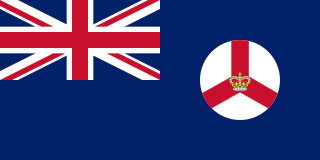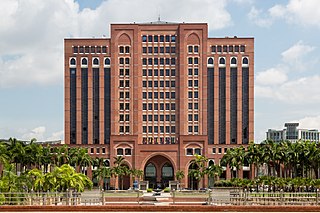A national security council (NSC) is usually an executive branch governmental body responsible for coordinating policy on national security issues and advising chief executives on matters related to national security. An NSC is often headed by a national security advisor and staffed with senior-level officials from military, diplomatic, intelligence, law enforcement and other governmental bodies. The functions and responsibilities of an NSC at the strategic state level are different from those of the United Nations Security Council, which is more of a diplomatic forum.
The Internal Security Act 1960 was a preventive detention law in force in Malaysia. The legislation was enacted after the Federation of Malaya gained independence from Britain in 1957. The ISA allows for detention without trial or criminal charges under limited, legally defined circumstances. On 15 September 2011, the Prime Minister of Malaysia, Najib Razak said that this legislation will be repealed and replaced by two new laws. The ISA was replaced and repealed by the Security Offences Act 2012 which has been passed by Parliament and given the royal assent on 18 June 2012. The Act came into force on 31 July 2012.
Law enforcement in Malaysia is performed by numerous law enforcement agencies and primarily the responsibility of the Royal Malaysia Police. Like many federal nations, the nature of the Constitution of Malaysia mandates law and order as a subject of a state, which means that local government bodies also have a role to play in law enforcement, therefore the bulk of the policing lies with the respective states and territories of Malaysia. Below are some of the law enforcement bodies and agencies of Malaysia.

The Colony of Singapore was a Crown colony of the United Kingdom that encompassed what is modern-day Singapore from 1946 to 1958. During this period, Christmas Island, the Cocos (Keeling) Islands, and Labuan were also administered from Singapore. Singapore had previously been established as a British colony since 1824, and had been governed as part of the Straits Settlements since 1826. The colony was created when the Straits Settlements was dissolved shortly after the Japanese occupation of Singapore ended in 1945. The power of the British Government was vested in the governor of Singapore. The colony eventually gained partial internal self-governance in 1955, and lasted until the establishment of the State of Singapore in 1958, with full internal self-governance granted in 1959.

The self-governance of Singapore was carried out in several stages. Since the founding of Singapore in 1819, Singapore had been under the colonial rule of the British. The first local elections on a limited scale for several positions in the government of Singapore started in 1948 following an amendment to the Constitution of Singapore.

The Royal Malaysia Police, is a (primarily) uniformed national and federal police force in Malaysia. The force is a centralised organisation, and its headquarters are located at Bukit Aman, Kuala Lumpur. The police force is led by an Inspector-General of Police (IGP) who, as of 23 June 2023, is Razarudin Husain.

The Ministry of Foreign Affairs, abbreviated KLN, is a ministry of the Government of Malaysia that is responsible for foreign affairs, Malaysian diaspora, foreigners in Malaysia, diplomacy, foreign relations, counter terrorism, bilateral affairs, multilateral affairs, ASEAN, international protocol, consular services, maritime affairs, and chemical weapons. It is currently based in Putrajaya. It is also widely known as Wisma Putra, which is also the name of its building in Putrajaya.

The Ministry of Home Affairs, abbreviated KDN, MOHA, is a ministry of the Government of Malaysia that is responsible for home affairs: law enforcement, public security, public order, population registry, immigration, foreign workers, management of societies, anti-drug, publication / printing / distribution of printed materials, film control, management of volunteer, rehabilitation and implementation of punishment.

The Ministry of Defence, abbreviated MINDEF or KEMENTAH, is a ministry of the Government of Malaysia that is responsible for defence, national security, army, navy, hydrography, air force, armed forces, intelligence services, counterintelligence, military intelligence, national service, and veterans affairs.

The Malaysian National Security Council (NSC) (Malay: Majlis Keselamatan Negara Malaysia (MKN), Jawi: مجليس کسلامتن نݢارا مليسيا) is a federal agency under the Prime Minister's Department. NSC is the agency responsible for advising the Malaysian government on matters related to national security and coordinating actions between various government agencies and departments to ensure the safety and well-being of the nation and its citizens.

The Prime Minister's Department is a federal government ministry in Malaysia. Its objective is "determining the services of all divisions are implemented according to policy, legislation / regulations and current guidelines". It is headed by the Prime Minister of Malaysia followed by other Minister in the Prime Minister's Department. The Department consists of the Prime Minister's Office, the Deputy Prime Minister's Office and more than 50 other government agencies and entities. The Prime Minister's Department was established on July 1957. Its headquarters are in Perdana Putra, Putrajaya.
The Institute of Accountants and Bookkeepers (IAB) was founded in the United Kingdom in 1973 and, as a non-profit organisation, in its early years focussed purely on being an international professional and examining body for bookkeepers.

The Ministry of Finance, abbreviated MOF, is a ministry of the Government of Malaysia that is charged with the responsibility for government expenditure and revenue raising. The ministry's role is to develop economic policy and prepare the Malaysian federal budget. The Ministry of Finance also oversees financial legislation and regulation. Each year in October, the Minister of Finance presents the Malaysian federal budget to the Parliament.

The Ministry of Human Resources, abbreviated KESUMA or MOHR, is a ministry of the Government of Malaysia that is responsible for skills development, labour, occupational safety and health, trade unions, industrial relations, industrial court, labour market information and analysis, social security. On 4 March 2024, the ministry was rebranded and started using the official acronym of KESUMA for all official business related to the ministry.

The communist insurgency in Sarawak was an insurgency in Malaysia from 1962 to 1990, and involved the North Kalimantan Communist Party and the Malaysian Government. It was one of the two Communist insurgencies to challenge the former British colony of Malaysia during the Cold War. As with the earlier Malayan Emergency (1948–1960), the Sarawak Communist insurgents were predominantly ethnic Chinese, who opposed British rule over Sarawak and later opposed the merger of the state into the newly created Federation of Malaysia. The insurgency was triggered by the 1962 Brunei Revolt, which had been instigated by the left-wing Brunei People's Party in opposition to the proposed formation of Malaysia.
The Research Division of the Prime Minister's Department (Malay: Bahagian Penyelidikan Jabatan Perdana Menteri) is an agency within the Malaysian Prime Minister's Department. According to a leaked US diplomatic cable dating back to 2006, the Research Division is actually the public name for the Malaysian External Intelligence Organisation (MEIO), the country's main foreign intelligence agency.

The National Security Council Act 2016 is "to provide for the establishment of the National Security Council, the declaration of security areas, the special powers of the Security Forces in the security areas and other related matters". This Act is intended to strengthen the government's ability to address increasing threats to the nation's security, including threats of violent extremism. The Bill was introduced into parliament by Shahidan Kassim on 1 December 2015. It passed the Dewan Rakyat on 3 December 2015, and the Dewan Negara (Senate) on 22 December 2015 without amendment. The Act received Royal Assent on 18 February 2016 in pursuant to Clause 4A of Article 66 of the Federal Constitution.
BKN, Inc. or Bohbot Entertainment was an American advertising and marketing company specializing in the children's market.







